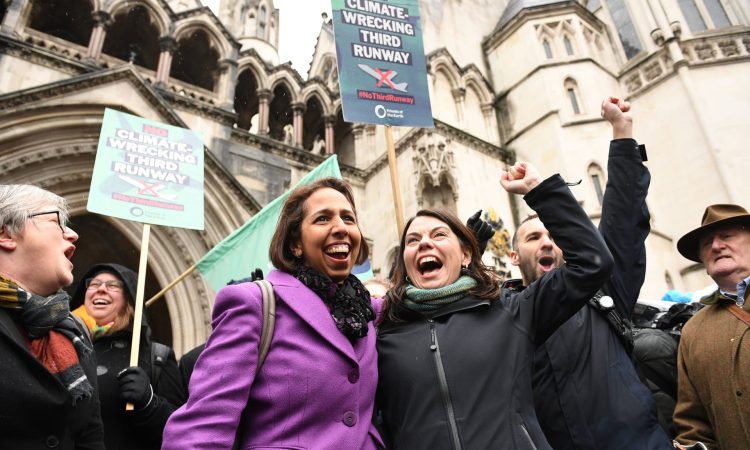Did the Court of Appeal ‘Kill Off’ the Heathrow Third Runway?
19 May 2020|Joanna Bell
- Research

In 2015, the now Prime Minister, Boris Johnson famously said of proposals to build a third runway at Heathrow that they were ‘undeliverable’ and that he would ‘lie down in front of those bulldozers and stop [its] construction’. Three years later, Theresa May’s government obtained Parliamentary approval of an ‘Airports National Policy Statement’ (herein ‘Heathrow policy statement’) which backed the building of a third runway. Disagreement about proposals to expand Heathrow have extended very far beyond the Conservative Party. The debate has raged for over a decade at both national and local levels and has focused on many issues.
Earlier this year the controversies took a new turn. On 27 February the Court of Appeal handed down a judgment in which it held that the Heathrow policy statement was unlawful. Why? Because the government had failed to have regard to the Paris Agreement (2015), an international agreement which significantly ramps up efforts to tackle climate change. This judgment had added new dimensions to the controversies surrounding Heathrow, as is well illustrated by a post tweeted by ex-Chancellor George Osborne:
Judges kill off Heathrow 3rd runway and Britain getting the modern air transport infrastructure we need, despite the elected Parliament voting for it overwhelmingly. Presumably this is the kind of overreaching undemocratic judicial activism Boris wants to curb ... or perhaps not
— George Osborne (@George_Osborne) February 27, 2020
The final remark here is clearly targeted at an irony in the political circumstances: the make-up of government has significantly changed and is now headed by Johnson who historically forcefully opposed the proposal. But what about the other claims made in Osborn’s tweet? Did the court ‘kill off’ Heathrow expansion? Was this really an example of ‘undemocratic judicial overreach’?
The answer to these questions is ‘no, not really.’ In order to understand why, it is important to explore the judgment and the legal background in a little more detail.
Decisions about infrastructure development, like airports, are governed by quite a lot of law. Why? Well, imagine a government is considering building a new road. Many considerations are potentially relevant to the decision and there are also lots of different ways in which the government could go about making it. This gives rise to lots of uncertainty and lots of questions. Law can contribute at least three things. First, stability. Law can be useful in providing a binding framework which structures decision-making, making clear (or clearer) what needs to be considered and how. Second, consistency. Rather than each decision being taken by a different, ad hoc process, law can ensure that similar decisions are taken by reference to the same basic principles. Third, protection. Certain important interests or values may be easily overlooked. A legal obligation to factor in those interests can make sure this does not happen.
In England and Wales, the law on infrastructure cannot be found in one place. The main provision, however, is the Planning Act 2008. Particularly important to the Heathrow case is section 5:
(7) A national policy statement must give reasons for the policy set out in the statement.
(8) The reasons must (in particular) include an explanation of how the policy set out in the statement takes account of Government policy relating to the mitigation of, and adaptation to, climate change.
This provision makes clear that the Heathrow policy statement was legally required to be accompanied by reasons explaining how ‘Government policy’ on climate change was considered. What was less clear, however, was what counted as ‘Government policy’. The government had thought it referred to a series of targets set out in an Act of Parliament which enacted the same year at the Planning Act: the Climate Change Act 2008. It had accordingly restricted its consideration to those targets.

But had it read the Act correctly? The Court of Appeal thought it hadn’t. An important point to grasp is that the Climate Change Act was enacted seven years before the Paris Agreement. The targets it lays down therefore respond to a different set of international commitments. The Paris Agreement ramps up the ambition. Specifically, it lays down commitments that the global temperature rise should be kept ‘well below’ 2 degrees above pre-industrial level and that signatories should make endeavours to aim for 1.5 degrees. Another important point to recognise is that climate change is a very fast-moving issue, scientifically, politically and legally. Scientific understanding is constantly evolving and international discussions take place regularly. In light of this, the Court of Appeal considered the government’s understanding of the term ‘Government policy’ had been too narrow. The court thought Parliament should be taken to have meant that the term had a more dynamic meaning. Afterall, if Parliament had meant the term to cover only the targets in the Climate Change Act 2008 why would it not have said that?
Is it right then to say that the court here ‘killed off’ Heathrow expansion? The above shows this is far too strong. As the court was keen to stress, the effect of the judgment was not that Heathrow expansion could not go ahead. Rather, it was that it could only go ahead once the government had complied with its duties under the Planning Act to consider Government policy on climate change. Was the Heathrow case, then, an instance of ‘undemocratic judicial overreach’? This is also a misleading description. The court here did not put itself in the position of government and ask whether or not it was in favour of a third runway. Rather, it performed the important legal task of interpreting the obligations contained within an Act of Parliament. As the arguments of the barristers in the case show, there are those who doubt the legal correctness of the Court of Appeal’s interpretation and the Supreme Court will, before too long, look at the issue again. Those strongly in favour of expansion might also find it difficult to stomach what they probably see as a set-back. It is difficult to see, however, what is ‘undemocratic’ or ‘overreaching’ about a court interpreting and enforcing legal obligations found an Act of Parliament.
Category: Research
Author

Joanna
Bell
Joanna is an Associate Professor, Jeffrey Hackney Fellow and Tutor in Law at St Edmund Hall. She teaches Administrative Law, Constitutional Law and Tort for the college, as well as Environmental Law for the Faculty.